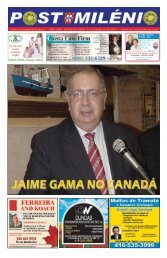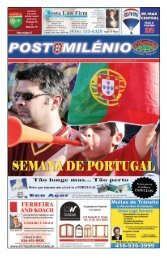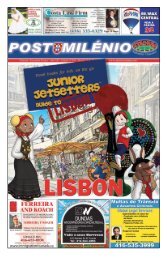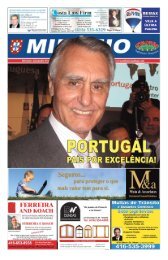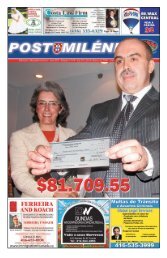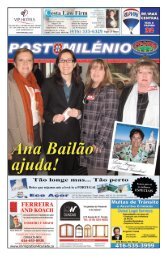VEJA O NOSSO ANÚNCIO NA ÚLTIMA PÁGINA - Post Milenio
VEJA O NOSSO ANÚNCIO NA ÚLTIMA PÁGINA - Post Milenio
VEJA O NOSSO ANÚNCIO NA ÚLTIMA PÁGINA - Post Milenio
Create successful ePaper yourself
Turn your PDF publications into a flip-book with our unique Google optimized e-Paper software.
30 20 a 26 de Abril de 2007<br />
Inside the inside<br />
Prison. Not somewhere where most<br />
of us will ever have to, or would<br />
want to go. Unless to visit someone<br />
else. Someone sentenced to spending time in<br />
a place where time itself grinds to a standstill,<br />
the days merge into weeks and routine<br />
takes a robotic hold on what for the rest of us,<br />
on the outside, is daily life. But the notion<br />
that a prison sentence is merely punishment<br />
for those who have done wrong is far from<br />
the truth. It is, in fact, an opportunity, at least<br />
for those held at Faro prison<br />
Opposite the municipal theatre in Faro is<br />
Faro prison, which has been visited regularly<br />
the past few weeks by The Portugal News.<br />
It is 'home' to 143 inmates, all men, 70<br />
per cent of whom are in preventative custody,<br />
the remaining 30 per cent serving 'hard'<br />
time.<br />
Surprisingly, 40 per cent of all Faro<br />
inmates are foreign. Fifteen nationalities<br />
including English, Scottish, French,<br />
Brazilian, Western European, African, and<br />
Chinese, as well as Portuguese, make up the<br />
institution's resident population. But<br />
arguably the most surprising feature of this<br />
prison is that its director is a woman.<br />
Most of the convicts in Faro are serving<br />
lesser sentences of anything up to five years,<br />
for crimes like drug trafficking in small<br />
quantities or theft. But most of those condemned<br />
to terms inside this establishment<br />
can (and indeed do) consider themselves fortunate.<br />
Divided into four departments - security,<br />
clinical administration, and education -<br />
each department has qualified, experienced<br />
professionals in charge to ensure everything<br />
runs like clockwork and provide the best<br />
possible chances of education and social reacceptance<br />
for those held inside.<br />
Drª Paula Quadras is the prison director.<br />
She is a petite, well-presented lady who has<br />
made it a personal mission to break down the<br />
boundaries and misconceptions surrounding<br />
offenders to offer them the best possible<br />
chances of becoming respectable and contributing<br />
citizens to the society they will be<br />
reunited with once free.<br />
Her philosophy is unique, and she<br />
defends that prisons should not be looked<br />
upon as "mere containers" for society's<br />
offenders.<br />
"From the moment individuals arrive<br />
they have to be prepared for their release"<br />
she explains, "We can give them that preparation,<br />
but they have to want to be the<br />
authors of their change".<br />
To achieve this, in the year and a half that<br />
the establishment had been under her supervision,<br />
she has introduced a diverse range of<br />
activities to motivate the prisoners and promote<br />
the learning of new skills, at the same<br />
time encouraging drug detoxing and<br />
hygiene.<br />
Yoga, handicrafts, carpet weaving, music<br />
lessons, poetry competitions, an internal<br />
newspaper and painting classes are but a few<br />
of the activities that have been introduced.<br />
Voraciously accepted, for many of the<br />
inmates these activities have become a<br />
means of mental escape from their confines:<br />
something to look forward to whilst reflecting<br />
on their pasts, motivation to endure yet<br />
another day of their terms.<br />
Dr. Júlio Melo is one of three educational<br />
technicians. After spending five years as a<br />
prison guard he sat exams to become an<br />
institutional educational advisor, something<br />
that gives him great satisfaction. This department<br />
offers convicts the chance to acquire<br />
educational qualifications whilst in prison,<br />
creating tools for the men to re-build their<br />
futures on the outside. Courses including<br />
table serving and bartending, as well as conventional<br />
schooling, can be attended.<br />
"Seeing an offender come in with no<br />
education whatsoever and leave with the<br />
ability to read and write makes it all worth<br />
while" he says.<br />
Whilst most subjects have qualified<br />
teachers, others, such as the painting classes,<br />
rely on the inmates' own interaction and<br />
sharing of skills.<br />
Language barriers disappear and positive<br />
behaviour is extracted through interaction,<br />
teaching and sharing. And the results are<br />
very surprising.<br />
The prison now boasts its own fourmember<br />
band, 'Band'Alheira', of which two<br />
members had no previous experience<br />
whosoever and were taught by fellow<br />
inmates, as well as picking up technique by<br />
sight and by ear. Playing impressive renditions<br />
of Rock and Roll favourites, the band<br />
performed for civil officials with primitive<br />
equipment at a Christmas party in 2005. The<br />
officials were so impressed that new instruments<br />
were donated from the civil governor,<br />
and are now put to very good use.<br />
One of Band'Alheria's founders,<br />
Portuguese inmate António Godinho, takes<br />
incredible pride in the accomplishments with<br />
his quartet.<br />
"It helps to escape from the daily grind,"<br />
he says in perfect English as he leafs through<br />
an immaculately hand-written book of lyrics.<br />
"It makes you feel alive".<br />
His dream is to one day be able to play<br />
for outsiders. He is also proud that upon his<br />
release a legacy will likely be left for future<br />
convicts to nurture and work towards.<br />
Band member Aleric Scott, an<br />
Englishman who has been in Faro prison for<br />
a matter of months, has adopted a very positive<br />
outlook towards his situation.<br />
"While I was on the outside I always<br />
wanted to learn to play an instrument<br />
because I have always been interested in<br />
music", he explained. "Unfortunate life didn't<br />
allow me the time or circumstances to do<br />
so. Now I can. I will put my time here to<br />
good use". "We're all here for a reason so we<br />
should be learning", he reflects.<br />
Faro inmates also put on play for visitors,<br />
participate in inter-prison competitions, and<br />
a selection of works of art will soon be put on<br />
display in their very first outside exhibition,<br />
held in the 'Armasen' gallery in Lagos,<br />
throughout the month of April.<br />
This upcoming exhibition is a dream<br />
come true for the eight men who participate<br />
in the daily art sessions. Prisoner Frank<br />
Walling takes pride on sharing his artistic<br />
talents with his fellow inmates, most of<br />
which have never painted or drawn before.<br />
According to two of the resident psychologists,<br />
it is also important in the sense<br />
that it gives the men an opportunity to<br />
regain lost values, as well as proving to the<br />
outside world that they have positive qualities.<br />
Contradicting the general perception of<br />
'criminals', the expressive freedom found<br />
through art creates a window to reveal a<br />
more sensitive side, something translated<br />
through the time and effort that is taken to<br />
complete the paintings.<br />
Another impressive case is that of prisoner<br />
João Almeida, whose time in Faro has<br />
given him direction and determination to<br />
succeed in society after his release.<br />
João has fallen in love with traditional<br />
'Arraiolos' carpet weaving. He spends up to<br />
five hours a day dedicatedly weaving a carpet<br />
he is making for his mother to thank her<br />
for unfailing love and support.<br />
After his release João, who suffers a 70<br />
per cent handicap in one of his hand and<br />
which significantly improved following his<br />
venture into carpet weaving, hopes to get a<br />
grant to start a small business selling the traditional<br />
'Arraiolos' wools and threads, as<br />
well as making and restoring the carpets.<br />
'Arraiolos' carpet making is a dwindling<br />
Portuguese tradition and one that João aims<br />
to prolong.<br />
Someone else who has seen the improvements<br />
in both the prisoners and their routines<br />
over the past 18 months is head of security<br />
Chef Manuel Lourenço, who has been with<br />
the prison for over 32 years.<br />
"Some of the men who end up here<br />
arrive through unfortunate circumstances,"<br />
he says, "once imprisoned they realise that it<br />
is not a life to aspire to and when they leave<br />
they do change. It's great to see someone ten<br />
or twenty years down the line, who did time<br />
in prison when they were younger and really<br />
made something of their lives".<br />
Life inside starts at 07h30, when the<br />
inmates are released from their cells, and finishes<br />
at 21h00 when silence is installed and<br />
cells are locked down.<br />
During this period the prisoners have<br />
time from 09h30 - 13h00 and 14h30 - 17h00<br />
to go about their various activities.<br />
The main aim, however, is to try to give<br />
the men some of their independence and<br />
self-worth back so they have every possible<br />
chance of succeeding after release.<br />
According to Drª Quadras, there are various<br />
ways that outsiders can help and she<br />
would like to appeal for others to take this<br />
into consideration. Here is how you could<br />
help. As a business, your small tasks (i.e.<br />
folding flyers, putting letters in envelopes,<br />
folding textiles, etc.) can be undertaken by<br />
prisoners for a small fee. The revenue from<br />
these jobs will revert towards materials for<br />
workshops and items of personal hygiene.<br />
Offer work experience to prisoners completing<br />
their sentences. Gardening, construction<br />
works, assistance on golf courses, etc,<br />
are all positions that would be gladly filled.<br />
A trial period can be requested. Organise<br />
exhibitions or showcase inmate's work.<br />
Donate materials (paintbrushes, paper,<br />
paints, oils, pencils, etc.). A list of necessary<br />
items can be issues on request.<br />
After spending a morning at Faro Prison<br />
the question was posed if at anytime I felt<br />
threatened or intimidated. My answer was<br />
decisively "No". Curiously, I felt privileged<br />
to have witnessed determined individuals,<br />
both criminals and non-criminals, making a<br />
genuine effort to positively re-invest in a<br />
society that may once have been seen as an<br />
enemy. For more information, contact Drª<br />
Paula Quadras on: (+351) 289 805 190, or<br />
send a letter to: Estabelecimento Prisional<br />
Regional de Faro, EN125, 8000-126, Faro.





